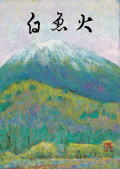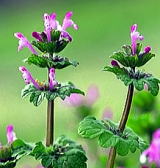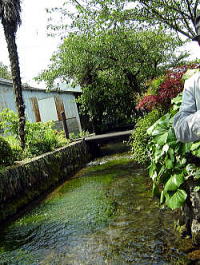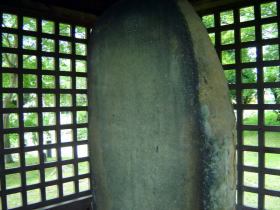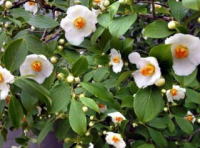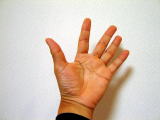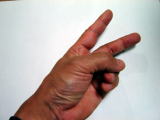| 最終更新日(update) '07.12.30 | ||
| 2007 |
||
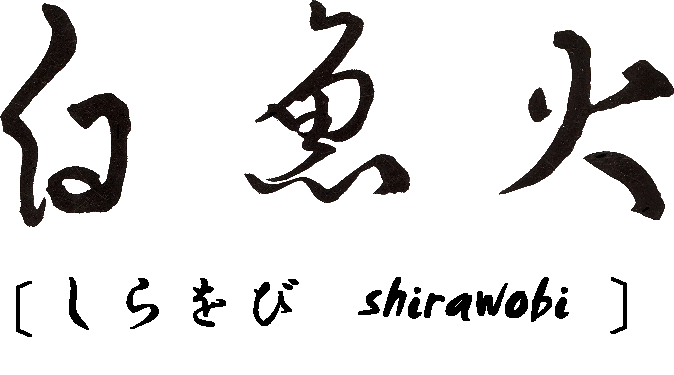 |
||
|
|
||
| ここに掲載の句は白魚火誌の“白魚火秀句”に掲載されたものの英訳です。 翻訳はホームページ担当者が行っていますので、作者の意に染まないところや名前の読み違いには直ぐに対応します。メール |
||
|
|
||
| Shirawobi is the name of a Haiku magazine and an association of Haiku
enthusiasts that has existed for fifty years in Shimane Prefecture, Japan. The following Haikus are written by the members of the Shirawobi group, selected by its chairperson Mr. Masafumi Nio, and rendered into English by its web-site editor. The words in the single brackets are Haikus in Japanese and those in double brackets are the authors' names. |
||
|
|
||
| Haikus Selected from '07 January edition of the Shirawobi |
| to '07 January Japanese page |
|
|
| (Hyakkan ni hyaku no kaze are take noharu) ((Ootsuka Sumie)) a hundred of banboos generate a hundred kinds of autumn breezes (Tori no ich hito ni osare te hito wo osu) ((Maeda Kiyokata)) the Festival of the rooster-- the crowd to shrine push me so I push crowd ahead too *Tori-no-ichi: Festival of the rooster, is a festival of Shinto Shrine in November in Japan. That celebrates the gods of luck and business prosperity; and people buy bamboo rakes as good luck charms, there. (Hovering shi te sekirei no e wo nerau) ((Sawa Koushin)) a wagtail is hovering over the food to get (Michisugara kondate kimaru shin-shouga) ((Kotou Hiroe)) new ginger plants-- I decided the menu for dinner on my way home from my field (Taifuu ni jyouriku to iu shinro ari) ((Ootaki Hisae)) typhoon has the course to be on shore (Ochiayu no take-su no ai ni agitoe ru) ((Shibayama Yousaku)) autumn-ayu are gasping on bamboo fish trap (Aki-same ga ikki ni ten wo otoshi keri) ((Satou Akira)) autumn shower fell the clouds at once (Yare-bashou migoto na heii-habou kana) ((Oonuma Kozan)) broken leaves of Japanese banana reminds me the old fassion with worn school uniform and cap (Furusato wa Mexico datte aki-zakura) ((Kubo Miyoko)) I hear that cosmos is from Mexico |
|
|
| Haikus Selected from '07 February edition of the Shirawobi |
|
| to '07 February Japanese page | |
|
|
|
| (Nakaumi no oku naru umi no shigure kana) ((Araki Chizue)) *the lake behind Lake Nakaumi-- it drizzles in early winter *This is Lake Shinji in Shimane prefecture. (Jyuuich-gatsu owaru ko no ma no umi no iro) ((Ninomiya Tetsurou)) the end of November-- I watch the Bungo Channel through trees (Bohimei wa ise-shinkurou ryuu no tama) ((Suzuki Keiko)) the epitaph is Ise Shinkurou... the berry of *dragon-whisker plant *Ise Shinkurou is an name of Houjyou Souun who governed Tokyo area in 16th century. *Dragon-whisker plant: ophiopogon japonicus is called ryuu-nohige or Jya-no-hige in Japanese. . (Oshidori no koyoku hazume ru yama no umi) ((Shinowara Yonejyo)) the flips of mandarin duck's wings sound cheerfully on a mountain lake (Gakusou no kanshou narasu fuyu-momiji) ((Masuyama Masako)) the student of Buddhist priest rings the bell for a Buddhist sermon... winter red leaves (Palette ni fude no fukuramu yama-momiji) ((Hayashi Tokuzou)) a paint brush swells well in the palette... autumn tints (Kaki-sudare kage sayu re i shi shouji kana) ((Watanabe Etsuko)) the shadows of dried cinnamons swing on shoji screens
(Fuyu-ichigo mezuru tekubo ni korogashi te) ((Maruya Sumiko)) I appreciate winter-strawberries... by rolling on my palm. (Tai wo yaku nioi mo koaji Ebisu-kou) ((Yamanishi Etsuko)) the smell of broiling sea beam is good... a festival in honor of Ebisu *Ebisu is the God of business and prosperity in Japan. (Cha no hana no hitotsu da ni naki chaen kana) ((Aoki Gensaku)) There was no green-tea plant that has flowers (Gyouan ni habataku oto wa kamo nara mu) ((Tsuchie Kouryuu)) the flapping of wings before dawn must be of wild ducks |
|
|
|
| Haikus Selected from '07 March edition of the Shirawobi |
||
| to '07 March Japanese page | ||
|
|
||
| (Shuugou wa yabusame doori hana-yatsude) ((Suzuki Yuriko)) the rendezvous is at *Yabusame street... fatsia flower *Yabusame is a type of Japanese archery, one that is performed while riding a horse. The archer shoots a special "turnip-headed" arrow at a wooden target.This style of archery has its origins at the beginning of the Kamakura period. Minamoto no Yoritomo became alarmed at the lack of archery skills his samurai had. He organized yabusame as a form of practice. (Ikutsu-me no jyoya-no-kane yara yume no naka) ((Taniyama Mizue)) I listen to the *watch-night bell between asleep and awake *The watch-night bell:Joya-no-kane in Japanese, is struck 108 times as a new year ceremony in temples in Japan. (Alibi wa taiyou ga shiru hinataboko) ((Ikeya Takahiko)) only the sun may establish my alibi... basking in winter sun (Shuutome ni nite ki shi tachii me-shougatsu) ((Takaoka Yoshiko)) my manner has been influenced by mother-in-law... *January fifteenth January fifteenth is a kind of holiday for house wives who have been very busy since New Year day. (Kiri-bari no ookina hana ya yama nemuru) ((An-nou hisako)) a big patch of flower-shape paper for shoji screen... gentle winter mountain (Koki majika shoujiki-sugiru hats- kagami) ((Muramatsu Ayako)) nearly seventy years old, the mirror is too honest for me... New Year's day (Wakaki hi no kao shika shira zu gajyou kaku) ((Okada Boen)) I am writing a New Year's card to a friend, never seen since young (Chikadou no iriguchi deguchi toshi no kure) ((Aoki Ikuyo)) the entrance and exit of underpass... the end of a year (Ga no tsuyoki seikaku imada hotoke-no-za) ((Suzuki Keiko))
|
||
|
|
| Haikus Selected from '07 April edition of the Shirawobi |
| to '07 April Japanese page |
|
|
| (Shin-en no roppyaku-kabu no kan-botan) ((Torigoshi Chinami)) six hundred peonies are in the garden of the shrine, in winter (Byou-shin no kotori to ugoki toshi arata) ((Masuoka Mieko)) the second hand moves a second with a clink... happy new year! (Sae kaeri sae kaeri hoshi chikaku naru) ((Toujyou Mitsuo)) the crisp days are again, the stars are closer . (Haha to iu tate ushinahe ri kan-yuyake) ((Gotou Yoshiko)) I lost my mother and a shield of mine... winter sunset clouds (Tonari no hi waga-ya ni utsuri kaji-jigoku) ((Yamazaki Asako)) the next door's fire has spread to my house... the inferno (Hajimari no futari to nari nu nen-shu kumu) ((Hayashi Hiroyo)) drinking new-year sake, we returned to the day got to know each other (Kan-beni no hake ru karakuchi hiyou kana) ((Okada Boen)) the bitter criticisms come out from the lip putting on a winter red-lipstick (Yuzurare nu hanashi to nari nu me-shougatsu) ((Yamada Tomiko)) the negotiation turned to what I must not give up... January fifteenth (Oni-sama ni nari taru ako ya yuki-matsuri) ((Sagawa Haruko)) my son is playing the leading character of the yuki-matsuri (Risshun no komatsuna oyogu nabe no naka) ((Yamane Tsuneko)) Mustard Spinaches swim in a boiling hot-pot... the first day of spring |
|
|
| Haikus Selected from '07 May edition of the Shirawobi |
| to '07 May Japanese page |
|
|
| (Hareki-tte yokan kibishiki Okhotsk) ((Asano Kazue)) fine weather... in the sea of Okhotsk, the lingering cold is severe (Kan-botan gasshou hodoku komo no naka) ((Motosugi Ikuyo)) a winter peony blooms like releasing jointed hands in prayer in a cover of straw mat (Kusa-mochi ni soe shi tegami no shimeri kana) ((Saitou Miyako)) the letter with *kusa-mochi got slightly wet *kusa-mochi is a rice-cake mixed with young mugwort. (Uraraka ya shiomi-zaka made toomawari) ((Kamakura Kazuko)) one beautiful spring day, I detoured to Shiomi-zaka *Shiomi-zaka is a steep slope on Japan's route 1, where we can see the Pacific Osean and is adjaicent to Hamamatsu city. (Kasu-jiru ya sewa-nyoubou ni narenu mama) ((Watanabe Sachie)) Kasu-jiru soup-- I have not been a house wife but a career woman *Kasu-jiru soup is a kind of miso-soup with Japanese sake lees. (Shima-jyuu ga oboro-zuki-yo to nari ni keri) ((Taguchi Kou)) the whole island is in a spring night with a hazy moon (Haru no kaze wagamama wo iu sukoshi iu) ((Kobayashi Satsuki)) I caught a spring cold... I became selfish a little (Setsubun-sou soma no seseragi oto tate te) ((Narita Yukiko)) Setsubun-so-- wood cutter's brook is murmuring (Yuki-guni no oto no komore ru fuyu hanabi) ((Hirama Jyun-ichi)) the sounds of fireworks in a heavy snow region were indistinct |
|
|
| Haikus Selected from '07 June edition of the Shirawobi |
| to '07 June Japanese page |
|
|
(Ashiato no inu shika kitsune kinone aku) ((Nishida Mikiko)) footprints of dog, deer and fox-- the laying snow around birches began to melt (Hanazuou itsu made tsuzuku shakkuri zo) ((Ninomiya Tetsurou)) Japanese redbud-- the hiccups wouldn't stop * Hanazuou is Japanese redbud, and the scientific name of redbud is Cercis canadensis . (Tori kumo ni nokosa re shi o-ku yomi-kaesu) ((Takama You)) the migratory birds to the north-- I am reading his pasthumous haiku works . (Hinaga towa kure te sewashiki hi nari keri) ((Ooishi Tomie)) the longer daytime is, the busier housewife is in the evening (Tabi ni areba nani mo wasure te asane kana) ((Aoto Shizuyo)) on the trip... I, housewife enjoy being a late riser (Kokorozashi kataku tamochi te sakura kana) ((Andou Kimifumi)) cherry blossoms remind me of the samurai spirit (Hyaku sai no oba no katami no haru-coat) ((Arita Kikuko)) I keep the spring coat as a memento of a hundred year-old aunt |
|
|
| Haikus Selected from '07 July edition of the Shirawobi |
| to '07 July Japanese page |
|
|
| (Haru no kari sora ga yukkuri kure te yuku) ((Kobayshi Fusako)) spring wild geese-- the sky is gradually getting dark (Haru fukashi sobaya ni sou to tonari-au) ((Shimizu Kazuko)) middle of spring-- I shared a table with a priest in a noodle shop (Kakei-zu ni kuuhaku ooshi shouwa no hi) ((Maeda Kiyokata)) there are a few blanks in our family tree-- Showa emperor memorial day (Taikon no kinen no kitte shouwa no hi) ((Itou Tomoe)) Showa emperor memorial day-- I have a commemorative stamp of his wedding *Showa emperor: Hirohito, was born on April 29, 1901; married in 1925; and passed away in 1989. Now, his birth day is a national holiday called the Showa (emperor) memorial day. (Itajiki ni mushiro ya watari gyofu no nema) ((Goshima Kyuukou)) the bedroom for migrant fishermen was with wooden floor and straw mats (Kaze hikaru Vienna shounen gasshou-dan) ((Ezure Koujyo)) bright spring winds-- Vienna Boys' Choir comes (Haha yori mo too nagarae te yomogi tsumu) ((Nakanishi Akiko)) I turned ten years older than my mother's age at death... picking mugworts (Tori-gumori mijika kari keri oi no kako) ((Maekawa Kimiyo)) migratory birds to the north... my ninty years flied like an arrow |
|
|
| Haikus Selected from '07 August edition of the Shirawobi |
||
| to '07 Auguust Japanese page | ||
|
|
||
| (Shoubu-fuki ima mo yagou de yobu kurashi) ((Yoshioka Fusayo)) shoubu-fuki* tradition-- they friendly call each other with the ancestal house-name * Shoubu-fuki is a dying tradition to protect the house from misfortune and evil by putting bundles of iris' leave on the eaves during the children's days in May. Sorry that the URL referred is in Japanese. (*Baika-mo* ya ie made go-ho no hashi kakaru) ((Shimizu Kazuko)) flowers of algae-- the bridge is in five feet to the house
(Nyuusha-shiki hayashi no you na otoko-tachi) ((Takahashi Kakou)) new employment ceremony-- guys are tall like woods . (Ichi-nichi de ue-ta to nase ri ni tan go se) ((Shinoda Shouji)) I planted rice in half-acre field by one day (Ao-shigure yufu-dake aogu ashi-yu kana) ((Wakiyama Sekishou)) drops from greenery-- I look up Mt.Yufu , soaking my legs in hot spring (Ao-arashi umi no nioi wo hakobi keri) ((Hara Kazuko)) a gale of greenery-- it brought the scent of the ocean (Patto chiri soutto modoru medaka kana) ((Gotou Masaharu)) killifishes disperse suddenly then gather secretly (Chichi-haha no jiman mo kuyou kiri no hana) ((Mitsuoka Yasuko)) bragging of my parents is a kind of memorial service... paulownia's flower (Tsuyu harema okurete piano totsugase ri) ((Ogiwara Tomie) blue sky in rainy season-- I shipped her piano to the newly-married daughter |
||
|
|
| Haikus Selected from '07 September edition of the Shirawobi |
| to '07 September Japanese page |
|
|
| (Kubi hitotsu mawashi roku-gatu owari keri) ((Ninomiya Tetsurou)) the end of June-- I turned my neck once (Ta ichi-mai hodo no sekkei asama-yama) ((Fukushima Fusako)) the remaining snow on Mt. Asama has shrunk as small as a rice field (Hasu no ha ni amatsubu hitotsu hekigyo no ki) ((Toujyou Mitsuo)) a raindrop fell on a lotus' leaf... the anniversary of Hekigyo's death * Mr. Hekigyo Fujikawa was one of leaders of the Shirawobi. (Waribashi no kireini ware te suzushi kari) ((Kobayashi Satsuki)) a half-split chopsticks split cleanly... it's cool! (Sensei ni tomodachi-kotoba camp no yo) ((Hazama Toshiko)) students talk to their teacher too friendly... at camping night (Imo sasu ya kaze no omotaki yuu-magure) ((Takamura Hiroshi)) I am planting sweet potatoes in humid air, at dusk (Shoubu mi ni tsuma tsure dase ba ame ni ai) ((Tanaka Ishi)) I took my husband to see iris garden-- it rains |
|
|
| Haikus Selected from '07 October edition of the Shirawobi |
|||
| to '07 October Japanese page | |||
|
|
|||
| (Ryou-fuu no jizai ni kayou tagajyou-hi) ((Shimizu Kazuko)) Tagajo stone-monument is exposed to cool breezes
(Otoko-buri age shi shimekomi dashi wo hiku) ((Taniyama Mizue)) wearing loincloth, manly guys pull a float (Shiosai wo mimi ni nokashie te kami arau) ((Shinozaki Atomi)) the sound of sea is lingering on in my ears-- I wash my hair . (Keidai wo dere ba tsune no yo shara no hana) ((Ihara Noriko)) coming out of the temple precincts, I returned to this world-- the flowers of Shara
(Hito-nigiri hodo no shima ni mo shin-chijiri) ((Katou Yoshie)) a pine tree with green pine-cones is on a palm-sized-like islet (Ama-ashi no futo ku nari tari dai-nenbutsu) ((Satou Shouko)) a summer shower comes on fast... Dai-nenbutsu *The Dai-nenbutsu is a folk art in Hamamatsu region, which is a series of dance with requiem performed by local young men and women groups on the Bon festival days in summer. |
|||
|
|
| Haikus Selected from '07 Nobember edition of the Shirawobi |
|||
| to '07 November Japanese page | |||
|
|
|||
| (Tori-odoshi hikari no yore te ori ni keri) ((Sakashita Shouko)) bird threatening devices made of audiotape twist sunlight *Tori-odoshi is the device to threaten the birds that harm rice crops in the rice-field by making loud sound, mysterious ray by pulled-out audiotape or showing dead bird. (Gesshoku no tsuki agari keri ushi no maki) ((Nishida Mikiko)) the moon in eclipse has risen above a cattle ranch (Hiru-zake no sugi taru *doyou-tarou kana) ((Yumiba Tadatishi)) I drank much sake in the middle of the first day of doyou * Doyou is eighteen days of the hottest period of summer, in the lunar calendar in Japan. (Dougan no ani no iei ya shuusen-ki) ((Morino Itoko)) my brother's picture killed in the war is boyish looking... the anniversary of the end of the war (*Zansho-mimai aoki ink no otoko-moji) ((Nakajima Keiko)) the zansho-mimai card, written by man with blue ink *Zansho-mimai is the card that offers the best wishes for his or her health in the lingering hot summer. (Inabikari seika ni kagi shi inuru toki) ((Maeda Kiyokata)) I lock and leave my late-parents' house... lightning (Bon-sou ni kikaruru ine no deki-guai) ((Sano Eiko)) Bon-priest asked me this year's rice crop (Mushi-megane hawase ru jisho ni ari ga noru) ((Kikuma Chiyoko)) I run reading glass over a dictionary, find an ant then ("Paa" no te mo " guu" no te mo ari kumo no mine) ((Suzuki Makoto)) I find *"paa" and * "guu" hands in the towering thunder-clouds *Janken game: scissors-paper-stone game, is played to fix things like order of participation or victory or defeat in insignificant games. By saying "jankenpon" plays putting forward "paa"(paper) or "guu"(stone) or "choki"(scissors). Victory is determined with stone breaking scissors, scissors cutting paper, or paper covering stone.
(Natsu oshimu koppu no koori yuri narashi) ((Takaha Katsuko)) rocking and ringing ices in a glass, I regret summer is over |
|||
|
|
| Haikus Selected from '07 December edition of the Shirawobi |
| to '07 December Japanese page |
|
|
| (Tooku yori meboshi wo tsuke te take wo kiru) ((Itou Tomoe)) I mark a bamboo from far, then cut it (Konomi furu shima wo kakomi shi nami no oto) ((Nishimura Matsuko)) the sound of wave surrounded an isle where nuts fell down (Kusa no hana furui no soko ni mizu sukoshi) ((Takubo Mineka)) flowers of grasses -- a little water is in the old well . (Mamushi-sou mi to nari tsuma wo odorokasu) (Okuno Tsuyako)) Viper-plant had berries, that astonished my husband (SL no kemuri hai-yuku susuki-bara) ((Kadotani Akira)) steam-locomotive's smoke crawls on a field of pampas grasses (Mitsuryou no sake morai taru hoshi no shita) ((Satou Isao)) I received poached salmon in the starlight (Futatsu mitsu kuri wo hiroi shi *jyofuku kana) ((Nakamura Kuniji)) *Jyofuku had picked up a couple of chestnuts *Jofuku is the person who lived in Chin dynasty. He was ordered to get the elixir of life by the emperor. They say he lived at the bottom of Mt. Fuji in Japan, later. |
|
|
